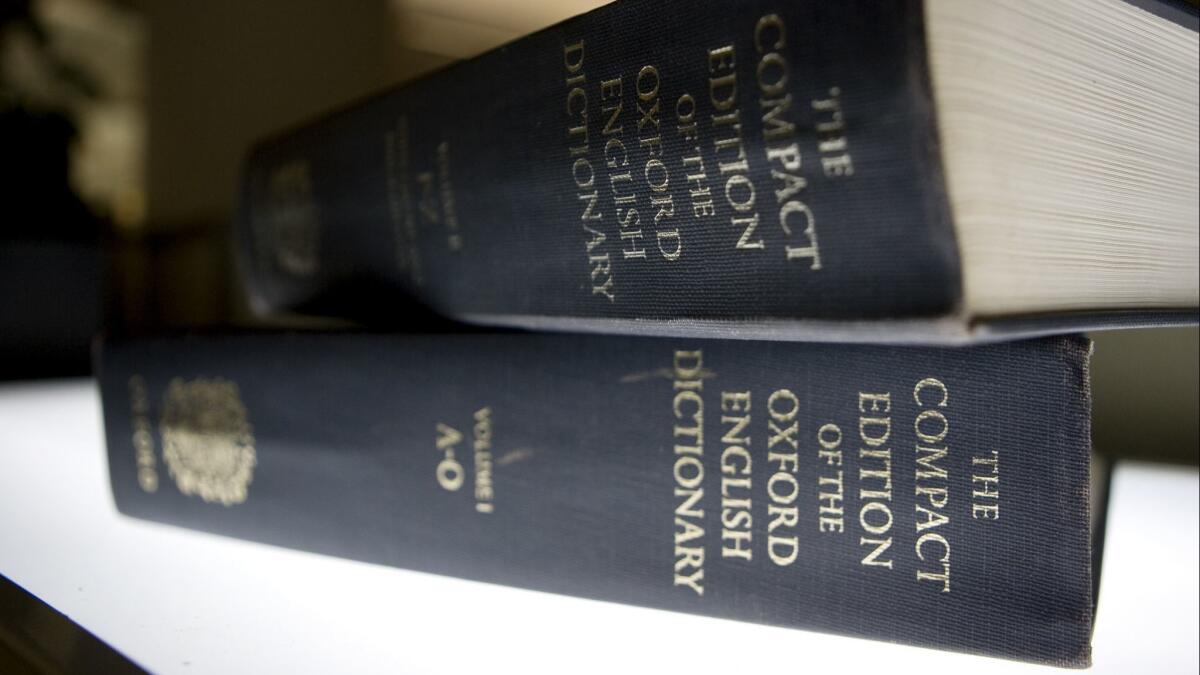Op-Ed: The story of 2018, in two words: ‘Toxic’ and ‘misinformation’

At the end of each year, lexicographers take it upon themselves to sum up the zeitgeist of the previous 12 months in a single “word of the year.” For 2018, the editors at the Oxford English Dictionary and at Dictionary.com chose “toxic” and “misinformation,” respectively.
Last year, their words were “youthquake” — a large movement or social change brought about by young people — and “complicit.” The year before, “post-truth” and “xenophobia.”
You can see where this has been going. For the past three years — let’s face it, the years that Donald Trump has dominated the news, along with his troubling and often fabulist rhetoric about foreigners, liberals, race and other subjects — the vocabulary that sums up our attitudes has been on the dark side, a stark sign of our troubled frame of mind.
For the past three years, the vocabulary that sums up our attitudes has been on the dark side, a stark sign of our troubled frame of mind.
The dictionaries loosely base their choices on upticks in the number of times words are looked up. Oxford noted that the number of times people looked up the word “toxic” increased by 45% on its website. The staffs also take into account the number of times the word is used online, and then they deliberate, assessing how a word reflects popular mood and its potential for lasting impact as a word of “cultural significance.”
That might not be completely scientific, but it looks sound enough, judging from the results. With the exception of “youthquake,” a word that hasn’t exactly been on everyone’s lips, the words of the year are ones we instantly recognize from the news, from social media and from conversation.
Even “youthquake” seems downright prophetic, at least in hindsight. Only two months after the word was given the annual crown, 17 people were killed at Marjory Stoneman Douglas High School in Parkland, Fla., and young people would rock the nation with the power of their conviction to end gun violence.
A somewhat arbitrary word of the year might seem like a simplistic mirror to hold up to a 365 days of human failings and accomplishments, but it is as good as any other figurative finger on the pulse of society. Observed over the course of time, the words can show us how we’ve progressed, regressed or simply stood still.
From 2006 to 2008, Oxford’s chosen words for the U.S. (it maintained a separate list for the United Kingdom, where it’s based) were “carbon neutral,” “locavore” and “hypermiling,” the last meaning a collection of driving techniques to improve a car’s fuel efficiency. Our interest in environmental consciousness and responsible food-growing were signs of a society trying to do good. Just before the 2016 campaign and presidential election, the words reveal a giddy interest in technology: “GIF,” “selfie,” “vape” and “emoji.”
The words we use aren’t simply reflective of our collective state of mind; they may have a role in actively creating it. Researchers have shown that words affect how we think and behave. A 2011 study out of Stanford University found that depending on what words were used to describe a crime, people would be more or less inclined to want to respond to the wrongdoing by providing more social services.
Enter the Fray: First takes on the news of the minute »
According to a TEDx article about the study and the power of words, “When people are presented with stories that liken crime to a ‘virus’ ‘infecting’ a city, they are more likely to recommend social services as a solution to crime than those who read stories describing crime as a ‘beast’ ‘preying’ on a city, who are apt to recommend stricter systems of justice and greater police presence.” People’s political leanings have a predictable effect on their reactions to stories of crime, the researchers found, but the metaphors used to describe crime had an even stronger effect.
Language sets us apart from other species. Words are our stock in trade, not just of writers and teachers, but of us all. They are the discrete units of the stories we tell. We can hope that our storytelling reflects a more positive world view next year — “checks and balances” maybe, or “empathy.”
Be careful what you post and look up online. Your words might just shape the future.
Yvette Benavides is a professor of creative writing at Our Lady of the Lake University in San Antonio, Texas, and a commentator on Texas Public Radio.
Follow the Opinion section on Twitter @latimesopinionand Facebook
More to Read
A cure for the common opinion
Get thought-provoking perspectives with our weekly newsletter.
You may occasionally receive promotional content from the Los Angeles Times.






